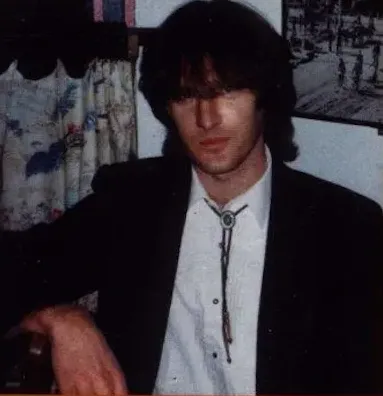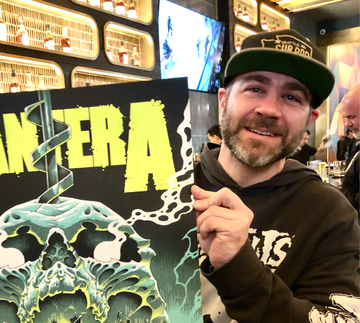The ‘90s alternative scene had no shortage of tragic figures. The era produced rock stars who were exceedingly flawed. Music media seemed to glorify the tortured genius more than any other decade and genre in years past. We all know the stories. Kurt Cobain. Layne Staley. Scott Weiland. Chris Cornell. One sad ending after the next, some spanning years of mental and spiritual anguish – all self-inflicted.
Even sadder still are the ones who never made it - the truly talented musicians who burned out before they had a chance to fade away. Those who could have altered the trajectory of ‘90s music even more than they did had they been able to sustain any kind of presence or stability.
Doug Hopkins’ story might be more tragic than any of the aforementioned talents. His story fits the ‘90s mold of the tortured genius perhaps better than the four legends above. Chances are you’ve never heard of him. But you know every word to one of his songs - if not more.
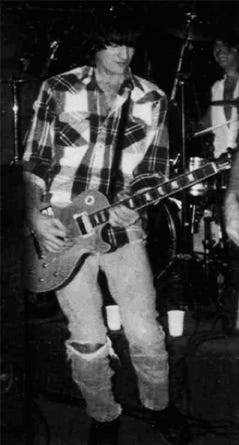
Musically, the story of Doug Hopkins begins in the Tempe, Arizona. Tempe had a surprisingly vibrant music scene in the 1980s, though it wouldn’t really explode until the early 1990s. The Meat Puppets, who were most famous for making a surprise appearance at Nirvana’s MTV Unplugged session, hail from “The Valley’s” bar music scene, and were an inspiration for many in the area during the ‘80s. It also emerged due to a number of music clubs popping up around Mill Avenue and Arizona State University, affording new bands places to play their music for paying crowds.
Hopkins, a guitarist, formed his first band in 1981 while still enrolled at Arizona State with bassist Bill Leen. The two would play in several bands that achieved modest success in the Tempe bar scene over the next six years, with Hopkins becoming known throughout the Valley as a talented guitarist and songwriter. In 1987, the two would be founding members of by far the most popular band to emerge from the Tempe scene – the Gin Blossoms. A year later, the band would add Hopkins’ skateboarding buddy Robin Wilson as lead singer, Jesse Valenzuela as a second guitarist, and Phil Rhodes on drums to complete their classic lineup.
Hopkins served as the band’s primary songwriter, and they quickly gained popularity by playing a mix of covers and Doug’s originals. He was very sure of his musical abilities, and would often be disgusted by songs that received airplay that he perceived as inferior. He had an arrogance to him in that regard, which helped propel the band to the top of the Tempe scene, in which he was very respected. It also gained them an opportunity to record an album on an independent label, titled Dusted, by 1989.
The Gin Blossoms seemed destined for success, save one problem – their primary songwriter was battling depression and alcoholism. Many accounts describe Hopkins as having battled depression from a young age, with alcoholism being not far behind. The band’s name itself is a reference to drinking. Hopkins had come across a picture of hard-drinking actor named W.C. Fields with a caption describing him as “having gin blossoms” – a red nose caused by alcohol abuse. It was no doubt a tongue-in-cheek reference to problems he knew he had. This type of self-awareness and honesty was emblematic of who he was and would be evident in his songwriting, while also proving to be his biggest obstacle for success: knowing exactly what ailed him and being helpless to change it.
According to his friends, Doug Hopkins barely remembered writing “Hey Jealousy.” You probably could have guessed this is the song referenced in the introduction as the song you know every word to, and that’s because you do . “Hey Jealousy” is a perfect pop rock song. The verses, chorus, and overall composition are flawless. The lyrics are a harsh self-reflection and an honest plea while the music itself is upbeat and catchy. It is a top 5 song of the ‘90s. It is a timeless classic. And the guy who wrote it barely remembers doing it.
The lyrics read as a love letter to an ex-girlfriend, because that’s exactly what it is. Hopkins described it as being about the sister of a guy he’d been in a band with (Jim Swofford) that everyone fawned over. Doug apparently had a relationship with the girl, Cathy Swofford, but “blew the whole thing” with his drinking, of which there are a few references to in the original lyrics.
“Well, tell me do you think it'd be all right
If I could just crash here tonight?
You can see I'm in no shape for driving
And anyway, I've got no place to go
And you know it might not be that bad
You were the best I'd ever had
If I hadn't blown the whole thing years ago
I might not be alone
Tomorrow we can drive around this town
And let the cops chase us around
The past is gone, but something might be found
To take its place
Hey jealousy
And you can trust me not to drink
And not to sleep around
And if you don't expect too much from me
You might not be let down
'Cause all I really want is to be with you
Feeling like I matter too
If I hadn't blown the whole thing years ago
I might be here with you”
Robin Wilson eventually changed the lyric to “think” instead of “drink,” which made Hopkins furious. He believed that he wrote honest music and respected artists who bore their soul in their work, and he thought changing the lyric was dishonest to what the song was, which was true. These are raw, self-deprecating, real lyrics that he probably believed would win Cathy back. Genuinely sad, yet almost foolishly optimistic – a microcosm of himself. Though Doug’s efforts would be futile for his personal reasons, “Hey Jealousy” would turn into an enormous hit for the Blossoms that propelled the band to the national spotlight.
As if “Hey Jealousy” wasn’t enough, Hopkins also wrote the Blossoms’ second biggest hit. “Found Out About You” follows the same formula as its predecessor – miserable, sad lyrics behind pop rock genius composition. Hopkins wrote it after a girlfriend had broken up with him after an R.E.M. show, but not before she punched him in the face and left him with a black eye. She had apparently been running around on him, too. He was left depressed, drunk, and living in squalor. The original lyrics to the song were scribbled on the back of a crumpled show flier.
“All last summer, in case you don't recall
I was yours and you were mine
Forget it all
Is there a line that I could write
That's sad enough to make you cry?
And all the lines you wrote to me were lies
Months roll past the love that you struck dead
Did you love me only in my head?
The things you said and did to me
They seem to come so easily
The love I thought I'd won
You give for free
Rumors follow everywhere you go
Like when you left and I was last to know
Well you're famous now and there's no doubt
In all the places you hang out
They know your name and they know what you're about
Street lights blink on through the car window
I get the time too often on AM Radio
Well you know it's all I think about
I write your name, drive past your house
Your boyfriend's over, I watch your lights go out
Whispers at the bus stop
Well, I've heard about nights out in the school yard
I found out about you
I found out about you”
A friend of Doug’s recalled him being extremely proud of having worked a line about AM radio into the song. Again, Hopkins proved himself to be authentic and profound in his songwriting, which was what his goal always was according to those around him. When you listen to this song, you feel depression, pain, and jealousy, all over brilliant musical arrangements that propel the song to power pop heights. He knew when he wrote it that he would make Robin “sound like a god” when he sang it due to a droning note in the melody. He had the whole song written in his head and pushed the band extremely hard to get it just right – and it was well worth it. The song would end up at #1 on the Billboard Modern Rock Charts in 1994. Members of the Gin Blossoms said it was the best song Hopkins ever wrote – which is saying something considering he wrote “Hey Jealousy.” Another brilliant work and a personal favorite of mine.
The power of these two songs, amongst other originals, provided the backbone of the previously mentioned independent album Dusted, released in 1989. Between the album and their live shows, the Blossoms garnered enough traction to start getting noticed by major labels. Hopkins did not support the band signing with a major label, saying that the band would be at the label’s mercy, becoming their property, which would be prophetic. Despite his concerns, the band signed with A&M Records in 1990. Hopkins was upset with the band for not respecting his misgivings, and became more stubborn, erratic, and drunk as the band moved forward towards recording a full-length for A&M.
When they entered the studio to record, the band hit a creative wall and could only produce a 5-song EP, titled Up and Crumbling, which was released in October of 1991. Hopkins contributed two songs: “Angels Tonight” and “Keli Richards.” The former contains a line stating he’d rather “drink until he sees angels tonight” while bemoaning party girls, while the latter is an ode to a porn star. They contain his signature poppy melodies, but with questionable lyrics that beg to question his headspace at this point.
The band continued to work on a full-length album into early 1992 in Memphis. Eventually they settled on re-recording some of the songs from Dusted, including “Hey Jealousy” and “Found Out About You” amongst others, for their major label debut, 1992’s New Miserable Experience. Hopkins would contribute four other songs to the album: “Lost Horizons,” “Pieces of the Night,” “Hold Me Down,” and “Cheatin’.” The lyrical themes are familiar – drinking, blacking out, partying, and infidelity, respectively. Though he didn’t receive credit for it, Hopkins also claimed he helped arrange most of the other songs on the record as well.
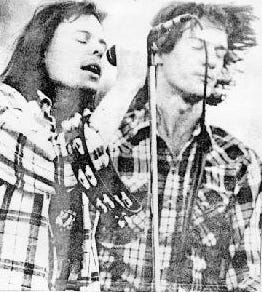
Despite writing nearly half of the band’s debut record, however, Hopkins would not see the recording process through. His drinking had become so overwhelming that he could not perform his guitar parts while recording. He would try to dry himself out, but the nerves and shakes he experienced wouldn’t allow him to play. By the time he drank enough to calm his nerves, he was too drunk to play them accurately – in fact, he was struggling to stand up straight. He attempted to cover up his drinking with mouthwash and aftershave. It became a vicious cycle that impeded the band’s progress towards completing a record that had already been delayed by their creative drought the year before.
The other members of the band were hesitant to fire Hopkins, given his creative prowess and pure musical talent. A&M saw it a bit differently and gave the band an ultimatum: fire Hopkins or get dropped by the label. Seeing the writing on the wall, the band cut ties with Hopkins and flew him back to Tempe. He was replaced by Scott Johnson, who still plays with the band to this day. Even worse, the band and A&M withheld $15,000 that it owed him until he signed over half of his publishing royalties, along with his mechanical royalties to Johnson, his replacement. Hopkins was in such dire straits that he accepted the deal. When the album was ultimately released, those who were familiar with his style agree that the band used Hopkins’ takes as the lead guitar tracks for the album, though it remains unresolved whether that’s the case.
Upon returning to Arizona, Hopkins was obviously disappointed and upset with the way things had turned out, to say the least. He badmouthed the Gin Blossoms in the Tempe scene. He formed a new band called The Chimeras (later called the Pistoleros), which would achieve modest success, and even garner a major label record deal on the back of song Hopkins wrote. He tried to spin his dismissal from the Blossoms as a positive thing in local press – now he could write for any vocalist’s style rather than being confined by Robin Wilson’s range, a dig at Wilson for changing his lyrics. He was going to sell out and make money with his talents as a songwriter – at least that was the plan.
Outwardly, Hopkins appeared to be moving forward. But internally, the Blossoms’ success and his well-documented flaws were wearing him down. Though New Miserable Experience started slow out of the gate, the album gained new life when “Hey Jealousy” was released as a single in June 1993. The song peaked at #4 on the Billboard Mainstream Rock chart, launching the Blossoms to a new level of success. They were everywhere: on the radio, on MTV, performing on David Letterman. When asked about the success of the song, Hopkins stated:
“It's my song, but I don't enjoy it. I mean, when it comes on the radio, I turn it off, because I don't really want to hear that. It doesn't make me feel good or anything.”
Friends tried to remind him that the album taking off was a good thing, but Hopkins repeatedly said he didn’t want to see “those guys” get famous off of his songs, especially considering the royalties he was forced to sign away, going as far to call the Blossoms “bastards making a killing off of my song.”
Friends of Doug’s in the Tempe music scene tried to reason with him that the success of “Hey Jealousy” was the ultimate validation of his ability as a songwriter. He wasn’t having it. He continued to drink. He quit The Chimeras after a poor live performance where he botched a solo. “Found Out About You” was released as the Blossoms’ next single and climbed the charts, and would eventually reach #1. New Miserable Experience was heading towards platinum status. Hopkins became more and more depressed, which led him to drink more and more.
He received a gold record, something he had dreamed of his whole life, for “Hey Jealousy” in November of 1993. He hung it on his wall for two weeks and then destroyed it. Hopkins became increasingly despondent in the coming days. His former bandmates from The Chimeras urged him to leave his door open so they would be able to check on him. On December 4, 1993, Hopkins went for an in-take consultation at a detox clinic. Afterwards, he purchased a .38 caliber pistol. He shot himself in the head on December 5th. He was found dead in his apartment later that day by his former bandmates. It was his sixth, and final, suicide attempt. He had $498 dollars in his pocket – every dollar he had to his name.
Family and friends around him knew it was coming. They had seen the man they knew deteriorate in front of them for years prior. His firing from the Gin Blossoms exacerbated what they had already known: Doug Hopkins was a man with incredible talent and incredible problems. Depression and alcoholism depleted him to this point of no return. Prior to his suicide on December 5, 1993, he had been hospitalized two weeks earlier from another attempt. Most around him knew that this was the probable end. Seeing his art become popular and not being able to enjoy it, if he even would have, and others capitalizing on it pushed Hopkins over an edge that he was dangling close to anyway. “He had lost everything through drinking” was the most common way it was said by those close to him.
As we approach the 30th anniversary of Hopkins’ death, Robin Wilson still calls it the most painful thing he’s ever had to go through. At the time of his death, the Blossoms were carrying on and touring, but released statements in the press heralding Hopkins for being both the founder and creative genius behind their success – he was the heart of the band. It had to be extremely difficult for them to fire Hopkins, especially knowing his demeanor and what it would do to him. Conversely, they had worked their whole lives towards a record deal – one which Hopkins warned them not to take – and were in jeopardy of losing it because the guy who wrote their best songs couldn’t keep it together. A terrible choice to have to make, and given the results, I’m sure one that they all regret deeply. Money tends to cloud judgment. The Blossoms actually ended up titling their next album Congratulations I’m Sorry as a nod to the bittersweet combination of their newfound success and Hopkins’ death. The band continues to this day, but never achieved the level of songwriting they had on New Miserable Experience, save a few songs like “Follow You Down” and “Til I Hear It From You.” The decision to fire Hopkins to remain on a major label had consequences morally and musically. In the end, though, Doug was right – the major label treated them like property; but only he paid the biggest toll.
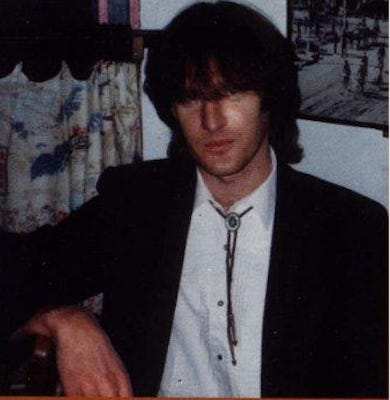
Doug Hopkins deserves to be known about – he has to be the most obscure songwriter from the ‘90s that never got his proper due in his time. His faults were as numerous as his talents. His songs were beautifully tragic, as was his life. “Hey Jealousy” and “Found Out About You” are timeless classics that will play on radio and elsewhere forever. He embodied the arrogant, tortured genius motif that became prevalent during the ‘90s moreso than any that came after him, and he did it by writing profound and real songs that came from the depths of his experiences. Hopkins was self-aware and knew who he was – and that he was helpless to change it. He lived it, and he wrote about it in a way that made you feel it, too. A desperate longing for something more. Knowing he needed to change but couldn’t. That’s who he was, so that’s what he wrote. I don’t think I can say it better than Doug did in “Lost Horizons”:
“The last horizons I can see are filled with bars and factories
And in them all we fight to stay awake
I’ll drink enough of anything to make this world look new again
I’m drunk, drunk, drunk in the gardens and the graves
She had nothing left to say so she said she loved me
I stood there grateful for the lie
I’ll drink enough of anything to make this girl look new again
I’m drunk, drunk, drunk in the gardens and the graves
Turn summer trees to bones and ice
Turn insect songs against the night
With words we build and words we break
I'm drunk, drunk, drunk in the gardens and the graves
Maybe I could use you to reassure myself
I wouldn't wish this indecision on anybody else
I’ll drink enough of anything to make this world look new again
The last horizons I could see are now resigned to memories
I never thought I'd still be here today
I’ll drink enough of anything to make myself look new again
I’m drunk, drunk, drunk in the gardens and the graves”
For more on Doug Hopkins, please visit http://losthorizons.info, which was a valuable research tool for this article.

